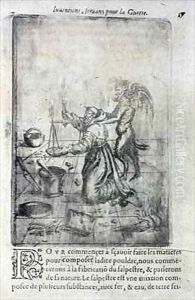Joseph Boillot Paintings
Joseph Boillot, born in 1546 and passing away in 1606, was a French artist, draughtsman, and engraver, whose contributions to the fields of art and cartography are remembered for their intricacy and historical value. His life and work were emblematic of the Renaissance period in Europe, a time characterized by a flourishing of the arts, and a deepened interest in the sciences and exploration. Boillot's career spanned a period of remarkable cultural and intellectual growth, and his works reflect the spirit of innovation and inquiry that defined the era.
Boillot was notably skilled in the creation of detailed engravings and illustrations, which were not only artistic expressions but also practical tools for disseminating knowledge. His expertise extended to the realms of geometry and military architecture, subjects on which he authored several treatises. These publications were richly illustrated with his engravings, serving as educational resources for contemporary and future generations. His work in cartography, particularly, contributed to the expanding knowledge of geography during his time, providing detailed representations of territories that were just being explored by Europeans.
Throughout his career, Joseph Boillot was commissioned by notable patrons, which was a testament to his skill and the esteem in which he was held. Despite the challenges of his era, including religious conflict and political upheaval, Boillot's work remained focused on the pursuit of knowledge and artistic excellence. His legacy is preserved in the collections of museums and libraries, where his engravings and treatises continue to be studied for their artistic merit and historical significance. Boillot's contributions to art and science exemplify the Renaissance man's ideal, deeply knowledgeable in multiple fields, and his life's work remains a fascinating intersection of art, science, and exploration.
